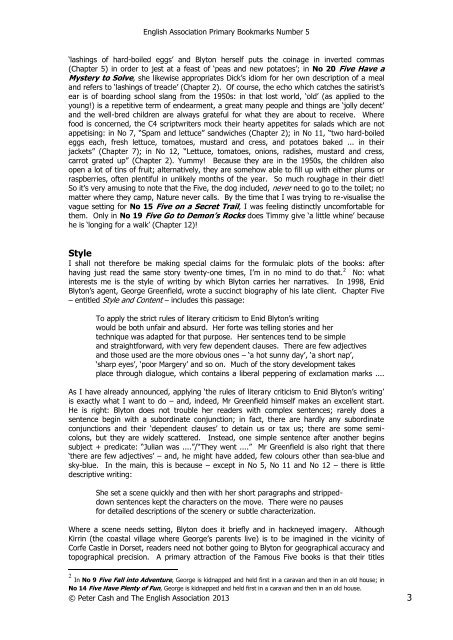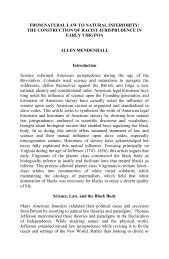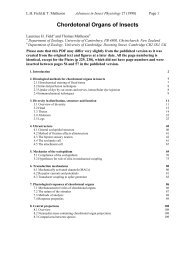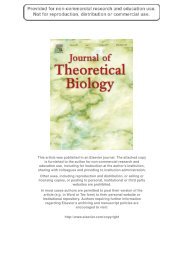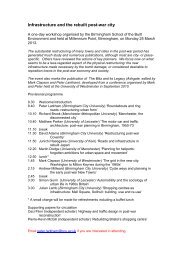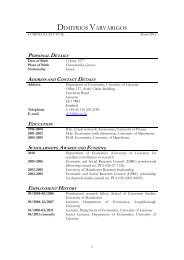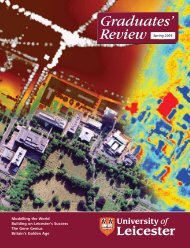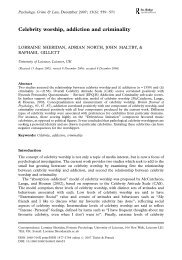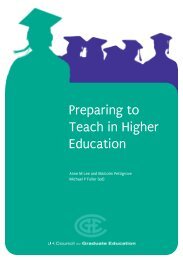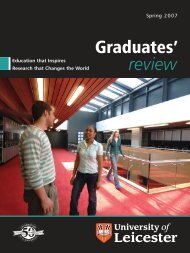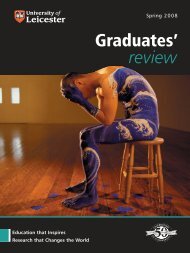Enid Blyton: The Famous Five Books - University of Leicester
Enid Blyton: The Famous Five Books - University of Leicester
Enid Blyton: The Famous Five Books - University of Leicester
Create successful ePaper yourself
Turn your PDF publications into a flip-book with our unique Google optimized e-Paper software.
English Association Primary Bookmarks Number 5‘lashings <strong>of</strong> hard-boiled eggs’ and <strong>Blyton</strong> herself puts the coinage in inverted commas(Chapter 5) in order to jest at a feast <strong>of</strong> ‘peas and new potatoes’; in No 20 <strong>Five</strong> Have aMystery to Solve, she likewise appropriates Dick’s idiom for her own description <strong>of</strong> a mealand refers to ‘lashings <strong>of</strong> treacle’ (Chapter 2). Of course, the echo which catches the satirist’sear is <strong>of</strong> boarding school slang from the 1950s: in that lost world, ‘old’ (as applied to theyoung!) is a repetitive term <strong>of</strong> endearment, a great many people and things are ‘jolly decent’and the well-bred children are always grateful for what they are about to receive. Wherefood is concerned, the C4 scriptwriters mock their hearty appetites for salads which are notappetising: in No 7, “Spam and lettuce” sandwiches (Chapter 2); in No 11, “two hard-boiledeggs each, fresh lettuce, tomatoes, mustard and cress, and potatoes baked ... in theirjackets” (Chapter 7); in No 12, “Lettuce, tomatoes, onions, radishes, mustard and cress,carrot grated up” (Chapter 2). Yummy! Because they are in the 1950s, the children alsoopen a lot <strong>of</strong> tins <strong>of</strong> fruit; alternatively, they are somehow able to fill up with either plums orraspberries, <strong>of</strong>ten plentiful in unlikely months <strong>of</strong> the year. So much roughage in their diet!So it’s very amusing to note that the <strong>Five</strong>, the dog included, never need to go to the toilet; nomatter where they camp, Nature never calls. By the time that I was trying to re-visualise thevague setting for No 15 <strong>Five</strong> on a Secret Trail, I was feeling distinctly uncomfortable forthem. Only in No 19 <strong>Five</strong> Go to Demon’s Rocks does Timmy give ‘a little whine’ becausehe is ‘longing for a walk’ (Chapter 12)!StyleI shall not therefore be making special claims for the formulaic plots <strong>of</strong> the books: afterhaving just read the same story twenty-one times, I’m in no mind to do that. 2 No: whatinterests me is the style <strong>of</strong> writing by which <strong>Blyton</strong> carries her narratives. In 1998, <strong>Enid</strong><strong>Blyton</strong>’s agent, George Greenfield, wrote a succinct biography <strong>of</strong> his late client. Chapter <strong>Five</strong>– entitled Style and Content – includes this passage:To apply the strict rules <strong>of</strong> literary criticism to <strong>Enid</strong> <strong>Blyton</strong>’s writingwould be both unfair and absurd. Her forte was telling stories and hertechnique was adapted for that purpose. Her sentences tend to be simpleand straightforward, with very few dependent clauses. <strong>The</strong>re are few adjectivesand those used are the more obvious ones – ‘a hot sunny day’, ‘a short nap’,‘sharp eyes’, ‘poor Margery’ and so on. Much <strong>of</strong> the story development takesplace through dialogue, which contains a liberal peppering <strong>of</strong> exclamation marks ....As I have already announced, applying ‘the rules <strong>of</strong> literary criticism to <strong>Enid</strong> <strong>Blyton</strong>’s writing’is exactly what I want to do – and, indeed, Mr Greenfield himself makes an excellent start.He is right: <strong>Blyton</strong> does not trouble her readers with complex sentences; rarely does asentence begin with a subordinate conjunction; in fact, there are hardly any subordinateconjunctions and their ‘dependent clauses’ to detain us or tax us; there are some semicolons,but they are widely scattered. Instead, one simple sentence after another beginssubject + predicate: “Julian was ....”/“<strong>The</strong>y went ....” Mr Greenfield is also right that there‘there are few adjectives’ – and, he might have added, few colours other than sea-blue andsky-blue. In the main, this is because – except in No 5, No 11 and No 12 – there is littledescriptive writing:She set a scene quickly and then with her short paragraphs and strippeddownsentences kept the characters on the move. <strong>The</strong>re were no pausesfor detailed descriptions <strong>of</strong> the scenery or subtle characterization.Where a scene needs setting, <strong>Blyton</strong> does it briefly and in hackneyed imagery. AlthoughKirrin (the coastal village where George’s parents live) is to be imagined in the vicinity <strong>of</strong>Corfe Castle in Dorset, readers need not bother going to <strong>Blyton</strong> for geographical accuracy andtopographical precision. A primary attraction <strong>of</strong> the <strong>Famous</strong> <strong>Five</strong> books is that their titles2 In No 9 <strong>Five</strong> Fall into Adventure, George is kidnapped and held first in a caravan and then in an old house; inNo 14 <strong>Five</strong> Have Plenty <strong>of</strong> Fun, George is kidnapped and held first in a caravan and then in an old house.© Peter Cash and <strong>The</strong> English Association 2013 3


